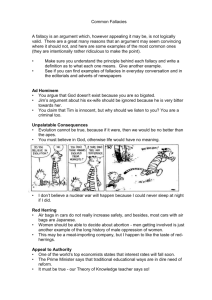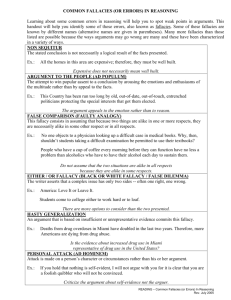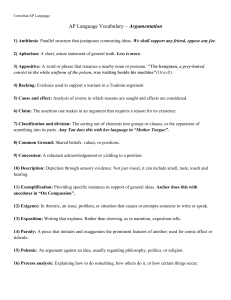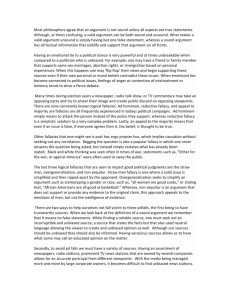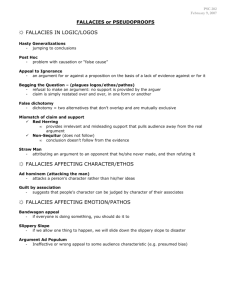Fallacies - Denny High School
advertisement
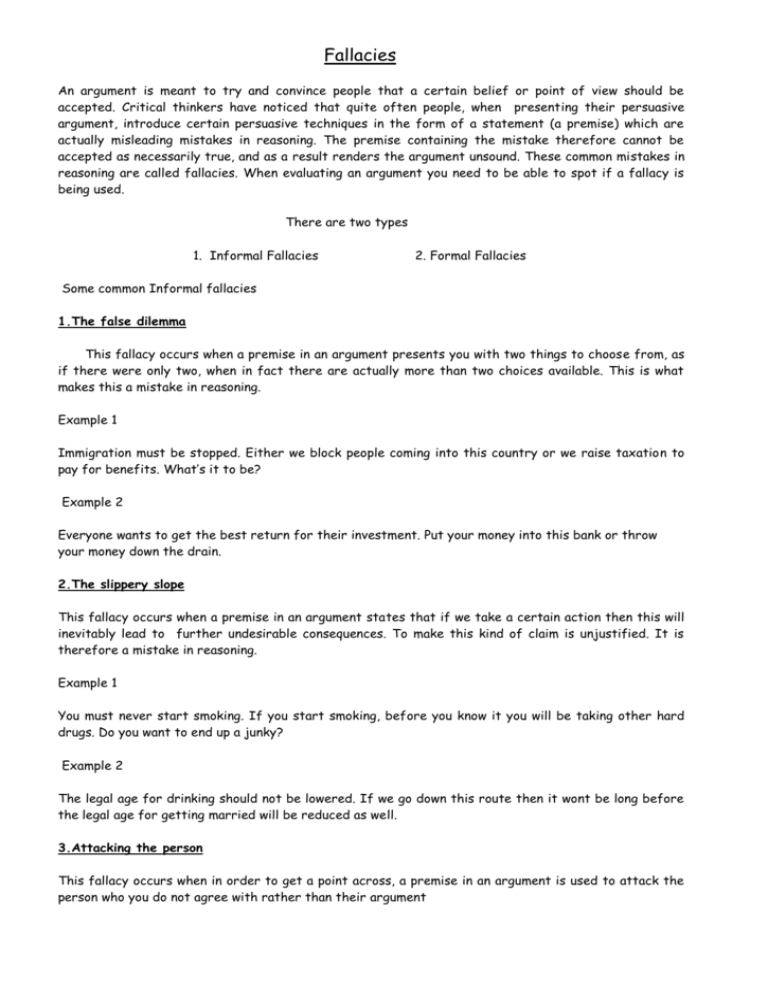
Fallacies An argument is meant to try and convince people that a certain belief or point of view should be accepted. Critical thinkers have noticed that quite often people, when presenting their persuasive argument, introduce certain persuasive techniques in the form of a statement (a premise) which are actually misleading mistakes in reasoning. The premise containing the mistake therefore cannot be accepted as necessarily true, and as a result renders the argument unsound. These common mistakes in reasoning are called fallacies. When evaluating an argument you need to be able to spot if a fallacy is being used. There are two types 1. Informal Fallacies 2. Formal Fallacies Some common Informal fallacies 1.The false dilemma This fallacy occurs when a premise in an argument presents you with two things to choose from, as if there were only two, when in fact there are actually more than two choices available. This is what makes this a mistake in reasoning. Example 1 Immigration must be stopped. Either we block people coming into this country or we raise taxation to pay for benefits. What’s it to be? Example 2 Everyone wants to get the best return for their investment. Put your money into this bank or throw your money down the drain. 2.The slippery slope This fallacy occurs when a premise in an argument states that if we take a certain action then this will inevitably lead to further undesirable consequences. To make this kind of claim is unjustified. It is therefore a mistake in reasoning. Example 1 You must never start smoking. If you start smoking, before you know it you will be taking other hard drugs. Do you want to end up a junky? Example 2 The legal age for drinking should not be lowered. If we go down this route then it wont be long before the legal age for getting married will be reduced as well. 3.Attacking the person This fallacy occurs when in order to get a point across, a premise in an argument is used to attack the person who you do not agree with rather than their argument Example 1 The war in Iraq was a mistake. The decision to go to war was made by George W. Bush who is a bumbling idiot who is as thick as two short planks. Example 2 You can’t accept what he says in the witness box. Everyone knows he’s a liar a scoundrel and a rogue. 4.Appeals to illegitimate authority This mistake in reasoning occurs when the conclusion of an argument is supported by a statement that appeals to some questionable source of authority. Example 1 If a bully hits you then you should hit them back. That’s what you should do because my dad says so. Example 2 Our society is becoming more violent. If you don’t believe me ask my next door neighbour who was mugged last week 5.Appeals to ignorance This mistake in reasoning works by assuming that if there is no evidence against the truth of a statement then the statement can be accepted as true. Example 1 I believe there is extra terrestrial life somewhere in our vast universe. After all there is no evidence to the contrary Example 2 Example 2 God exists. You can’t prove me wrong. 6.The circular argument This is the mistake in reasoning that involves assuming in a premise, the statement you’re trying to support with the premise. This fallacy occurs when either the same statement is used in a premise and the conclusion in an argument, or when one of the premises could not be known to be true, unless the conclusion were first assumed to be true Example 1 Only an untrustworthy person would be a politician The fact that all politicians are untrustworthy is proof of this Example 2 David: Anna: David: Look, women shouldn’t become soldiers. Why not? Because it is a job for a man Example 3 P1 The Bible says that God exists P1 The Bible is the Word of God Therefore God exists 7 The mistake which states or implies that one thing causes another when it cannot be shown to This is the mistake in reasoning that states there is a causal link between things, without good reason. Example 1 Example 2 Most ‘hard’ drug users start off as ‘soft’ drug users. The rise in violence in our country is linked to the rise in inner city poverty 8. An appeal to irrelevant consequences This is the mistake in reasoning in which a statement (a conclusion) is supported by a premise that either appeals to the good consequences that result from accepting it, or the bad consequences that result from not accepting it. Example 1 God must exist. The reason being that if he does not then we are all deluded. Example 2 Everyone should give money to Children in need, because it greatly helps under privileged children Fallacies Mistakes in reasoning which make an argument unsound 1. The false dilemma which only suggest two or more choices 2. The slippery slop where will it all end if you accept a particular idea 3. Attacking the person instead of the argument 4. Appealing to an illegitimate authority to support your argument 5. Appealing to ignorance for support of a premise 6. Circular argument in which the conclusion is assumed in the premises 7. Saying or implying that one thing causes another 8. Unjustified or illegitimate appeals to authority 9. An appeal to irrelevant consequences Formal fallacies Formal fallacies relate to the structure of the argument. and make an argument invalid Example 1 When the rule about conditional statements is broken a formal fallacy has been committed. (check out this rule) Example 2 The circular argument can also be said to be a formal fallacy.
